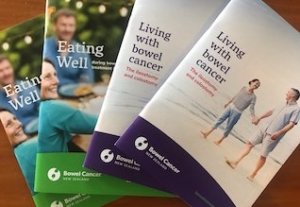2 February 2021
Although Covid-19 impacted our funding, it certainly didn’t slow us down. Below we highlight the great work we’ve been able to achieve in 2020, thanks to the support of our amazing bowel cancer community.
Advocate – As part of our 10 year anniversary we released our comprehensive 20 page ‘Call to Action 2025‘ document which details all the areas in bowel cancer care that we still need to improve. We called on the Ministry of Health (MoH) to immediately lower the screening age for the National Bowel Screening Programme for Māori to 50 years old. As part of CANGO (the alliance of Cancer Non-Governmental Organisations), we called on the government to improve our underfunded and unfair system for accessing medicines and to invest and further develop its health workforce.
Support – A key focus for our charity is providing nationwide, accessible patient and whānau support from diagnosis through to survivorship. Last year our support group increased by 29%. Our support service means 1003 patients and their families have received additional support around a bowel cancer diagnosis which helped lessen the burden of this disease. Last year we launched our new rehab partnership with Pinc and Steel and we have already funded 24 patients to have 4 sessions each of physio to aid in their recovery. We approached Augustine’s charity shop and were able to host ten women directly affected by bowel cancer. We created two new support resources, ‘Eating Well during bowel cancer’ and ‘The ileostomy and colostomy’ booklet. Dr Anne Mathieson joined our medical advisors, she offers a unique perspective as she has been a bowel cancer patient and is a GP.
Educate – Our website is a valued source of information for patients and whānau living with bowel cancer, which is why we worked hard to triple the information in our About Bowel Cancer section last year. In fact, 98,000 Kiwis accessed our website in 2020 which is a 72% increase on the year before. Unfortunately due to Covid-19 we were unable to attend the GP conferences that we normally do. Instead, we focused on running a comprehensive Mediboard campaign over 3 months which enabled us to educate Kiwis on bowel cancer symptoms at GP clinics, hospitals and pharmacies nationwide. As part of this education campaign we included for the first time digital mediposters which had 878,000 impressions and they ran for over 7,000 hours during that time. We also ran a nationwide Health TV campaign which reached 600,000+ viewers through TV screens in doctor’s surgeries and hospital waiting rooms. Our community ambassadors continued to give talks at workplaces, health organisations and communities around the country.
Awareness – Our life-saving Never Too Young campaign ran for the second time with the same success. This was solely an awareness-raising campaign that bowel cancer is not just an older persons disease, but also affects those under 50 years old. This year we added a compelling television advertisement and worked with TVNZ and Sky TV to run it in prime time slots. 1,745,000 people were exposed to the bowel cancer ad with the opportunity to see the ad 1.7 times. We created four animated, infographic videos and have utilised them through our social media to raise awareness of bowel cancer. We partnered with Great Full NZ to create our own line of Bum Hugger underpants with the dual goal of raising awareness in a fun way around bowel cancer and to raise funds. We continued to work with our brave patient advocates to share their stories in the media and had particular success with stories appearing on the 6pm news for TV1 and TV3.
Research – Bowel Cancer New Zealand was proud to fund a ‘National Case-Control Study of Bowel Cancer‘. The objective of this four-year study was to investigate the potential causes of the high incidence rate of bowel cancer in New Zealand. This study was the first to specifically examine the role of diet as a cause of bowel cancer and was undertaken by Dr Mary Jane Sneyd and Associate Professor Brian Cox of the Department of Preventive and Social Medicine at the Otago Medical School, in Dunedin.



